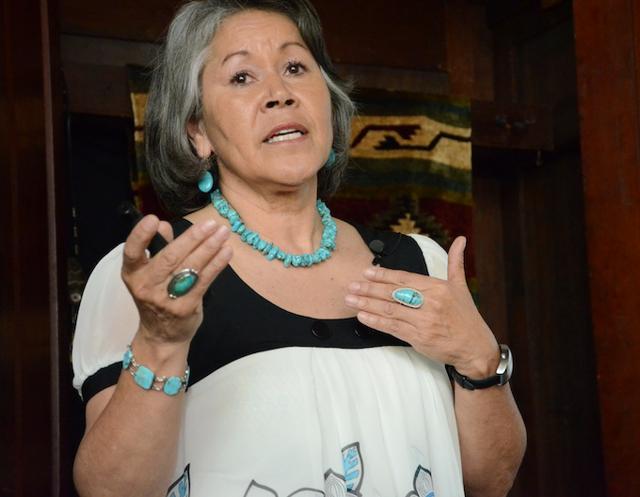Historical grief and trauma don’t just disappear, even after many years, Patricia Grant explained during an April 5 presentation at UNCA.
"When I think about being a Cherokee and what has happened to my people, I begin to recognize the psychic wounding on a massive root level, and how it has continued to impact many members of my community," she told the more than 50 people in attendance.
Grant, a licensed social worker, is the program director for Analenisgi, a mental-health and substance-abuse program located on the Qualla Boundary. She says her work in the community has underscored the depth of that trauma.
"We as Cherokees are a unique people, and we've been here at least 10,000 years," she said. "But when our life was interrupted and our culture was interrupted by these historical events, it left people wounded."
Tracing “the original Holocaust” from the arrival of European settlers to the present day, Grant told how Cherokee territory had shrunk from about 40,000 square miles to 54,000 acres by 1838. She also described the pain of forced assimilation in special schools.
"My mother would tell us, as we were growing up, some of the experiences she had in the boarding school," Grant recalled. "When they would speak Cherokee, they were severely punished." This was a major reason her mother never taught her or her siblings to speak Cherokee.
The psychic wounding inflicted by these collective cultural experiences, Grant maintained, has been unintentionally passed down through at least seven generations. It’s something she sees when helping people work through substance abuse at Analenisgi, which means “They are beginning” in Cherokee.
"Substances are used to numb our emotions, and when we talk about our first use, oftentimes it’s because family members have used it, or we've grown up around it, or we've been exposed to it through friends," Grant explained. "When someone has experienced trauma, using substances is a way to numb, or to forget, or deal with that pain. But at some point we cross the invisible line, and it becomes a way of life."
The best way to heal this trauma, she believes, is to "forgive the unforgivable." To help people achieve that, the Cherokee Healing and Wellness Coalition has organized a Journey to Forgiveness. The weeklong journey (May 19-25) will travel the Trail of Tears in reverse, bookended by a conference at each end. The project is for enrolled members of the federally recognized Cherokee tribes and invited guests.
Grant stressed, however, that the experience she described isn’t limited to the Cherokee. "Every culture has experienced historical trauma of some kind," she noted, adding, "We are trying to heal for generations of what has occurred."
A hunger to help others
Stevie Dunbar has been a regular at the SonRise Community Outreach Kitchen for a couple of months. After taking the shuttle to the Patton Avenue building, he chooses a table and waits. Within minutes, a woman wearing an apron arrives at the table, notepad in hand.
"Hey there. What would you like today?" she asks.
Dunbar studies the menu carefully before deciding. On this particular Saturday, the options include French toast, scrambled eggs, bacon, grits, strawberries and oatmeal. While deciding, he asks for a cup of coffee. "All right. I'll have that coming right up for ya," the woman says with a smile.
This, Dunbar explains, is why he comes here for breakfast every Saturday. "From the time you get on the bus, they've got kind words to say. They're trying to plant good seeds in our heart. They're just concerned about our well-being, and we should be also," says Dunbar, who’s been homeless for 11 years. After a pause, he adds, "They've always been really good to me."
For Tricia Markoff, one of the outreach kitchen’s six founders, giving back to the community and treating people with respect, regardless of their economic status, are essential. Every Saturday, she’s there pouring coffee and taking orders.
"For us, this is how we connect,” Markoff explains. “If people are just going through lines, sitting down and busing their own tables, we have very little people-to-people contact. This way, we're circulating, getting them juice, asking them if they’d like seconds. It's fun, and not only does it provide a relationship-building opportunity, it allows us to have more volunteer opportunities," she notes. All six founders are members of Mount Pisgah Academy Church in Candler.
Launched in November, the program initially provided two breakfasts a month. Since January, however, due to demand and determination, they’ve been operating every Saturday from 7:30 to 9:30 a.m. Every 30 minutes, a church shuttle bus brings in more hungry people — 100 to 125 on an average Saturday. But these free meals, stresses Markoff, are available to anyone who walks through the doors.
"This isn't just about the homeless community: This is about anybody who wants a really good, hot meal," she reports.
And for Dunbar, these weekly breakfasts reinforce his life's motto: "Sure, life is tough, but don't ever give up."
SonRise Community Outreach is at 1543-C Patton Ave. in West Asheville, next to David's Autohouse. To donate food or to volunteer, contact Tricia Markoff at 734-1989.
— Send your local health-and-wellness news and tips to Caitlin Byrd (cbyrd@mountainx.com), or call 251-1333, ext. 140.




Before you comment
The comments section is here to provide a platform for civil dialogue on the issues we face together as a local community. Xpress is committed to offering this platform for all voices, but when the tone of the discussion gets nasty or strays off topic, we believe many people choose not to participate. Xpress editors are determined to moderate comments to ensure a constructive interchange is maintained. All comments judged not to be in keeping with the spirit of civil discourse will be removed and repeat violators will be banned. See here for our terms of service. Thank you for being part of this effort to promote respectful discussion.